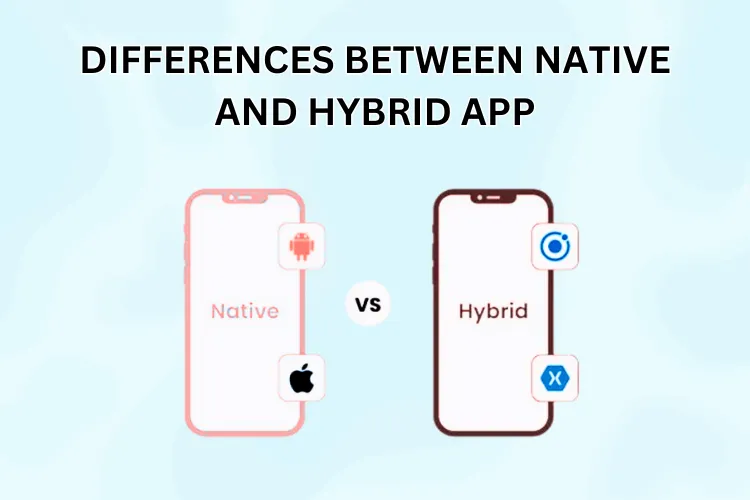
In today’s digital landscape, businesses are increasingly relying on mobile applications to engage customers, streamline operations, and boost revenues. When planning to develop an app, one of the most crucial decisions is choosing between native app development and hybrid app development. Each approach comes with its own set of advantages and limitations, influencing factors like performance, cost, and user experience. In this guide, we’ll explore the key differences between native and hybrid app development, helping you make an informed decision based on your business needs.
What is Native App Development?
Definition and Explanation
Native app development refers to building applications specifically for a particular operating system, such as Android or iOS. These apps are developed using platform-specific programming languages:
- Swift and Objective-C for iOS app development
- Java and Kotlin for Android app development
Advantages of Native Apps
✅ Better Performance: Native apps run faster and offer superior performance as they are optimized for the platform.
✅ Enhanced User Experience (UX): Designed according to platform-specific guidelines, offering a seamless UI/UX.
✅ Full Access to Device Features: Allows integration with GPS, camera, microphone, push notifications, etc.
✅ Improved Security: Native apps offer better security protocols, reducing vulnerabilities.
Limitations of Native Apps
❌ Higher Development Cost: Since separate apps need to be developed for different platforms, costs increase.
❌ Longer Development Time: Building separate apps for iOS and Android requires more time.
Need a high-performance native app? Our top-rated app development company offers best-in-class iOS and Android app development services. Call us now at +91-8200691281!
What is Hybrid App Development?
Definition and Explanation
Hybrid app development allows developers to create a single app that runs on multiple platforms using a single codebase. It is built using web technologies such as HTML, CSS, and JavaScript and then wrapped in a native container.
Popular frameworks for hybrid development include:
- Flutter app development
- React Native
- Ionic
Advantages of Hybrid Apps
✅ Cost-Effective: Develop once, deploy on multiple platforms, reducing costs.
✅ Faster Development: A single codebase speeds up development and updates.
✅ Easier Maintenance: Updates and bug fixes can be made once and applied across platforms.
✅ Wider Market Reach: Compatible with both iOS and Android without separate coding.
Limitations of Hybrid Apps
❌ Compromised Performance: Hybrid apps may not be as fast as native apps, particularly for heavy applications.
❌ Limited Access to Device Features: Some native features may not be fully supported.
❌ User Experience Variations: Can sometimes feel less intuitive compared to native apps.
Looking for a cost-effective mobile solution? Our mobile app development company specializes in Flutter app development to create high-quality cross-platform applications. Call +91-8200691281 to discuss your project today!
Key Differences Between Native and Hybrid Apps
| Feature | Native Apps | Hybrid Apps |
|---|---|---|
| Performance | Faster, more responsive | Slightly slower due to web-based code |
| User Experience (UX) | High-quality, platform-optimized | May not feel as smooth as native |
| Development Cost | Expensive (separate apps for iOS & Android) | More affordable (single codebase) |
| Development Time | Longer | Shorter |
| Access to Device Features | Full access | Limited access |
| Security | More secure | Potential security vulnerabilities |
When to Choose Native vs. Hybrid App Development?
Choose Native App Development If:
✅ You need high-performance apps for gaming, fintech, or healthcare.
✅ You want the best possible user experience with platform-specific optimization.
✅ Your app requires extensive use of device-specific features like GPS, AR/VR, and biometrics.
Choose Hybrid App Development If:
✅ You have a limited budget and want to develop for both iOS and Android simultaneously.
✅ You need a faster time-to-market with reduced development time.
✅ Your app does not require heavy processing or deep device integrations.
Cost Comparison: Native vs. Hybrid Development
Native apps generally cost more because they require separate development for different platforms, whereas hybrid apps allow you to create a single application for multiple platforms, saving time and money.
💰 Native App Development Cost Estimate: $30,000 – $300,000+ 💰 Hybrid App Development Cost Estimate: $15,000 – $150,000+
Want a cost-effective mobile app solution? Our expert mobile app development company can help you choose the right approach for your business. Schedule a free consultation today!
Which One is Right for Your Business?
If your goal is to provide a premium, high-quality experience for users and you have the budget, native app development is the way to go. If you need a budget-friendly solution with faster deployment, hybrid app development is a smart choice.
Why Choose Our App Development Services?
✅ Expert Team: Highly skilled professionals in iOS app development, Android app development, and Flutter app development.
✅ Transparent Pricing: No hidden charges – clear and simple pricing.
✅ Code Security: We follow best security practices to protect your app.
✅ 24/7 Support: We provide ongoing support to keep your app running smoothly.
✅ Client-Centric Approach: Tailored solutions to meet your business needs.
Conclusion
Choosing between native app development and hybrid app development depends on various factors like budget, performance needs, and time constraints. Both approaches have their strengths and limitations, and selecting the right one can significantly impact your business’s success.
🚀 Are you ready to develop a powerful mobile app? Our expert app development company is here to help! Call us at +91-8200691281 or schedule a meeting to discuss your project today!
Complete the Form Below and Get Your Quote in 24 Hours !
-
403, Avdhesh House, Opp. Gurudwara, S.G. Highway, Bodakdev, Ahmedabad - 380054, Gujarat, India.
-
Call Us : +91-8200691281
-
Mail Us : info@penguinpeak.com
